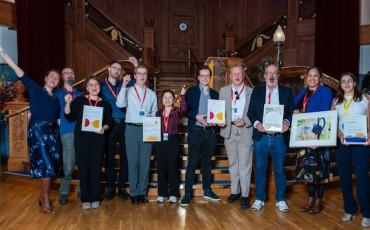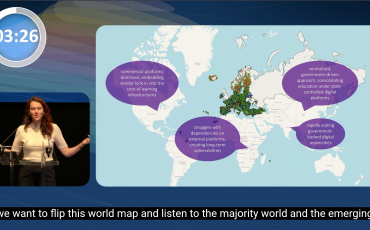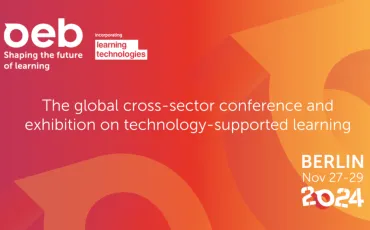Just before corona, I was pondering about my job. I have been involved in IT-innovation for education for fourteen years now. And every now and than I am wondering: is it time for something new? I am lucky to work with the most dedicated, inspiring, and enthusiastic people who all have a strong drive to use IT to change education for the better. But I also work in a bubble of “believers”, a bubble with people who dedicate their evening hours working on ways to stimulate the use of open educational resources, with people who experiment with micro-credentialing and edubadges, people who think about how we can use student analytics in a safe, secure and ethical way. My bubble doesn’t necessarily reflect the real world and daily practice of education. Because the teachers, CIO’s and educationalists I work with are also part of their own university where other questions and priorities ask for attention, and not everybody is so keen on exploring and using the possibilities of IT like they are.
On March 15, the lockdown in the Netherlands was announced. All schools and universities were closed. Of course a huge educational crisis. And to deal with that crisis, different worlds within universities had to suddenly come together to achieve the one essential goal they all have in common: student success. So everybody, literally everybody, proponents, opponents, those indifferent, experienced that IT was the key to ensure as much student success as possible in these pandemic times. Everybody in higher education needed to enter the bubble. And so they did, willingly or not, a believer or not.
With tremendous effort from everyone involved, universities managed to transform all classes and assessments to online versions within one week. Thanks to unbelievable creativity, hard work and dedication, students were able to continue their classes.
Were we prepared well to help universities at SURF, the collaborative IT-organisation for education and research in the Netherlands? I can only answer that with a big no. Are we now, after six months? Still, the answer is a big no. Since it is unthinkable that we will return to the era before corona, we will need to adjust our course, not in a bubble but in real life.
I will share some lessons I have learned these past months, and give some thoughts on how these lessons will affect the way we collaborate in the upcoming years, on a national and an international level.
1. Create a place for sharing and building knowledge
The greater the challenge, the more important it is to unleash as much thought and targeted action as possible within an organization. Corona made it clear how important it is to learn together and to be able to put different pieces of knowledge and disciplines together. To help each other. Only together, we were able to make this major operation possible. But collaboration and learning has to be organized. So creating a place for sharing and building knowledge is key. The universities that had already invested in these spaces had a headstart, but ultimately all universities had to put all hands on deck to connect people and knowledge.
At SURF we did so on a national level. We created the Vraagbaak, for online questions and answers. We used our existing online platform SURF communities and added a special space to ask and answer all kinds of questions. The strength of the Vraagbaak is the extensive expertise network of cooperating parties such as SURF, the Dutch Acceleration Plan, Comenius, a network of outstanding teachers, VSNU and Vereniging Hogescholen, the associations of Dutch universities and ECIO, the center for inclusive education. Because of these connected networks, we can quickly find and share the knowledge that is needed. We set up an editorial board, to identify developments at an early stage and identify themes for which there is a need to share knowledge. By connecting people, we are able to accelerate the sharing of experiences and expertise on urgent topics.
Articles, best practices, tips and tricks were posted and shared more than 10.000 times. Wisdom spread from within the walls of one university to include all universities. So far we organized 21 webinars on topics such as online proctoring, online interaction, peer feedback, online resources, online events, and so on, by asking experts in the field to share their knowledge and answer relevant questions. Every webinar attracted over 100 participants and are still being used.
Even when we addressed new topics, we were able to create new, large networks at short notice. For example, around the organization of online events when it became clear that the introduction of the new academic year would have to take place online as well.
Lessons learned
The questions we need to address are becoming more and more complex, the amount of people requiring answers to be able to do their daily job is growing and the pace at which these answers are needed is getting faster. Because networks had been operating within SURF for many years, knowledge exchange at national level was also relatively easy to organize. We need to foster and connect existing networks, and expand them.
Pitfalls
Playtime is over. IT for education is no longer something nice to have; it’s a must-have. We need to answer today’s questions, and we need answers quickly, for the benefit of current students. One of our pitfalls is that we often ignore the tough questions that require more time and effort to answer. For example: How can we use VR and AR for laboratory teaching and traineeships?
2. Establish new connections
This crisis also made it very clear that we need to establish new connections between people that previously could be and stay successful being in their own bubble. An example. Key to preventing students from falling behind was the offer of online exams. Most universities use assessment tools, but hardly any had previously used online proctor systems, and if they had, it had hardly been used on a large scale. So in no time, many universities had to purchase systems for online proctoring. But the decision on what system has to be purchased is a decision procurement departments of universities need to make together with educational specialists. Because online proctoring has a direct impact on education. Overall, there is no natural connection and workflow between educational specialists, experts on assessments, staff or students and the procurement department yet. Security and privacy are key elements of online proctoring. But there is neither an organic collaboration between procurement and Data Protection Officers and the Chief Information Security Officers. Apart from the fact that there was no time to make a procurement decision based on a vision around digital assessment and online proctoring, there is no infrastructure as of yet to connect all the expertise and everyone’s point of view needed in this process. Not within universities, and not within their national organization SURF.
Lessons learned
It is fruitful but also time consuming to build an infrastructure that fosters collaborations between Data Protection Officers, Chief Information Security Officers, procurement officers, assessment experts. Especially in times of crisis. And slow processes are killing, especially in times of crisis. Decisions have to be made at short notice. Quite some decisions have a long-term impact, such as perennial contracts for online proctor systems.
To build a safe, meaningful and sustainable environment for online and blended learning for years to come, we need to include different perspectives. We need to learn to understand and trust each other, learn each other’s language, value each other’s point of view. For the upcoming years, we have to invest in building this infrastructure.
Pitfalls
When you are busy managing a crisis, setting up new connections is one of the hardest things to do. Within one’s own working environment, let alone on a national level. We must ensure that these circumstances don't prevent us from seeking these new partnerships.
3. Innovation of education is not only about technology but also about politics
Online Proctoring also taught us that the use of IT can easily become political. To prevent students from falling behind universities chose to use online proctoring. Students rebelled because they felt their privacy was compromised. Their protests led to parliamentary questions. We are not only addressing technological questions from a political aspect, but we are also taking part in addressing political questions with technological aspects. At SURF we updated a whitepaper on online proctoring that we published in 2016. We worked hard to make the paper GDPR-compliant as quick as possible. We did not change the advice we formulated in 2016, namely not to use online proctoring if it is not necessary because of privacy issues, because we, as independent experts, still supported that advice. But in times of crisis the whole point was that universities had no easy alternative. We need to be aware of these political aspects when thinking and deciding about technology.
Lessons learned
We can no longer approach IT issues as straight forward technical issues. It means that IT-departments and national bodies such as SURF can no longer have a sole technical focus. That means we also need to develop new skills: communication, political awareness, tact. We need to be more sensitive in the timing and framing of information. And we need to be better aligned with other parties, such as student bodies, politics and include them in our discussions.
Pitfalls
We need to be careful not to become too cautious to bring in our expertise because we are scared to become part of a political storm. We need to organize the collaboration of different partners, and bring your own strengths into the discussion.
4. Protect public values
In this crisis, the tension between the urgent need of available online services, applications and tools, and the agreements we have so that we can use those services on the conditions that align with our values becomes more clear. Collective actions towards service providers are the only way to reach agreements with the supplier of the services we need and want to use, that meet those values. We cannot close those deals overnight. We have to meet tender rules and take care of legal compliance. And we have other values we want to protect. Because we want to provide a secure learning environment that is inclusive and accessible, and we want to ensure data sovereignty. To have an impact towards service providers, in terms of setting our own agenda instead of only following theirs, national or even international collaboration is needed.
I found it a bit shocking how little information we had on the privacy and security conditions of the tools we are using. So we had to prioritize. We helped universities that needed to make instant decisions on critical systems such as videoconferencing. We made an overview with available tools for education. But that are just drops in the ocean.
Lessons learned
The enormous increase in the use of ICT has highlighted our dependence on commercial service providers. Values such as security and privacy are rightly under a magnifying glass. But the dominance of service providers is considerable and growing. The need to take ad hoc decisions in this crisis unintentionally reduced the opportunities for joint action. We need to organize ourselves better in order to be able to negotiate good conditions.
Pitfalls
Universities have plenty of things in common, but they also have their differences. It is one thing to agree on the importance of collaboration, it is another thing to find a common goal and a common pace. Because we are at different starting points, collaboration might mean a delay for one university while going too fast for others. Waiting for the perfect starting point will lead to a standstill. We have to act under imperfect conditions, to work towards a future that we want to shape ourselves. Starting regardless of these conditions, in times of crisis, demands courage and perseverance and a lot of flexibility.
5. Create a common narrative of the future of education
Too busy extinguishing the fire to think about the future? That is a big mistake. Ok, teachers, IT-staff, students, they are exhausted, this turnaround demands the utmost from them. At the same time, there is a great deal of energy aimed at teaching students as well as possible. A clear vision gives direction to that energy. If the spot on the horizon is clear, staff can take the intermediate steps independently. And it really matters how we take our next steps. Because whether you are a believer or non-believer, blended learning is here to stay. This crisis, that forced universities to offer all courses and exams online, made clear what IT can offer, and what cannot be replaced in an online environment. Because we have this unique situation of being fully online, the dialogue on the future of education has a chance to become richer and broader.
This sudden shift to fully online courses showed us the benefits IT can offer education, but it also made clear what we lose by online education, what can never be replaced by IT. This shift to online education is a quick fix, not a well thought-out redesign of education. Together we need to figure out how to find the perfect balance. And since we don't know how long this crisis will last, this is an urgent question we need to answer for our current students. I think we can only find this balance when we collaborate. We were able to put men on the moon because we focused forces thousands of people. This should be possible.
Everybody involded in education has experienced pros and cons of IT in education. We have collectively learned about the necessity and not so self-evident digital literacy of both staff and students. We have learned about the necessity of protecting public value. We need to foster discussions on what we envision higher education to be because we need coordinated actions to design the future. We need to discuss our visions within universities, but also on a national and an international level. We can only meet these challenges, that are technical, ethical, political, didactic if we collaborate. I really hope that this crisis will be the beginning of creating an inclusive, accessible education system that offers the flexibility students need to be equipped for the labour market.
Within six months, my job has changed completely. I have had to reconsider everything. The challenges I have to work around, the way I need to collaborate, the skills I have to develop, the choices I have to make. I think this applies to all of us. This big, unbelievable crisis appears to be also a big opportunity to accelerate the ambitions we have been working on for years. Using IT to improve the quality of education. Not as a ‘nice to have’, but as a must-have. We entered reality with the speed of light. We are facing big a challenge. For me one that no other new job can offer. So I think still will be around for a while. I hope we will be continue working together.



0 Praat mee